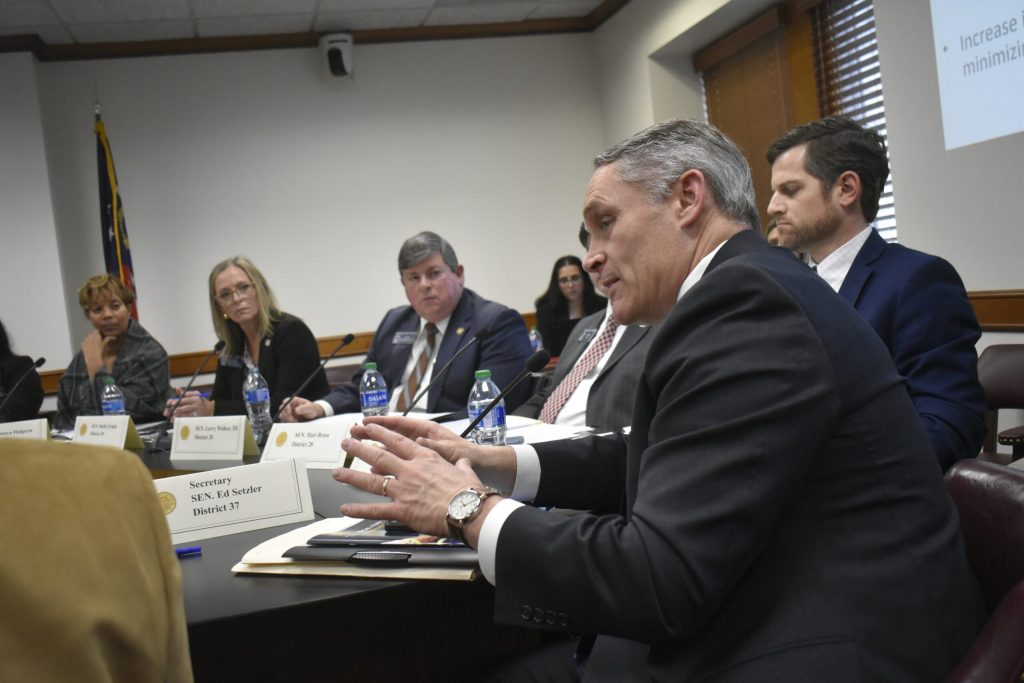‘Religious liberty’ legislation emerges from eight-year slumber at the Georgia Capitol

Acworth Republican Sen. Ed Setzler, front, is the lead sponsor of a religious freedom law he contends will protect Georgians from local and state government infringing on their rights to practice their faith. File photo Ross Williams/Georgia Recorder
The Georgia Senate Judiciary Committee advanced a divisive bill on Thursday that its backers contend will give people more protection from government intrusion while practicing their faith.
It now heads to the full Senate for a vote that could clear the way for it to make a crucial Crossover Day deadline Thursday.
Acworth Republican Sen. Ed Setzler said his so-called Georgia Religious Freedom Restoration Act would allow the state to plug a gap in a federal law by adding projections that put the First Amendment right to exercise religion on the same level as the right to freedom of speech, assembly and the press.
The bill, which was filed last year, was passed 6-3 on a party line vote, with Democratic committee members opposing the legislation.
Opponents warn it could pave the way for private employers to deny birth control to employees or otherwise intrude on personal decisions.
Setzler said the law could be used to protect people during pandemic lockdowns that forced churches to close their doors to in-person services. Detractors argue that the law would enable conservatives to use their faith as a reason to discriminate against members of the LGTBQ community and other groups by refusing to do business with them or provide certain services.
The U.S. Supreme Court ruled shortly after Congress passed the Religious Freedom Restoration Act of 1993, also known as RFRA, that the federal law only protected people from unfair federal government intrusion, and did not afford the same safeguards from state and local governments.
Since then more than 30 states have adopted their own state religious freedom laws in order to protect their residents from governmental overreach, Setzler said.
Following the U.S. Supreme Court’s ruling on gay marriage in 2016, Georgia Gov. Nathan Deal vetoed religious freedom legislation under pressure from major companies.
Setzler had said his bill has some significant differences from the state’s 2016 version and that the claims that the law will be used to discriminate against people who don’t hold the same beliefs as the majority of Georgians don’t hold water.
The federal religious restoration law requires that a government show that it has a compelling interest in enforcing a rule that is contrary to the religious faith of a person And that interest must be achieved as least restrictive as possible.
Setzler cited a legal case in Texas involving the law after a public school mandated that a Native American kindergarten boy must cut his long traditional style hair. In that case, his parents successfully won a lawsuit on the grounds that the school board couldn’t prove a compelling reason why the boy’s long hair should have been cut, he said.
“In 2017 the Georgia Attorney General confirmed that without a state religious freedom law, Georgia did not have full religious protections, allowing the state and local governments to infringe on people’s basic right to practice their faith, for any rational basis,” Setzler said.
“There’s a lot of histrionics and claims about what this bill does, but in fact, RFRA has a 30-plus year history of applying legitimate interests on both sides of the question and applying them in a fair and balanced way.”
Organizations opposing the bill on Thursday included Georgia Equality and faith leaders who represented a cross-denomination faction of Jewish, Catholic, Baptist and other places of worship throughout Georgia. The conservative leaning Georgia Baptist Mission Board were among a handful of organizations and residents who testified in favor of the measure.
Sarah Hunt-Blackwell, First Amendment policy advocate for the ACLU of Georgia, said that SB 180 does not mirror the federal act in one critical area. The state bill does not include an clause that prohibits the government from establishing a religion, she said
“I prefer that the government indeed has a compelling interest in protecting the rights of LGBTQ+ people who could otherwise be discriminated against under the guise of religious freedom,” Hunt-Blackwell said. “The Establishment clause is not optional. It is quite literally written into the fabric of our country’s constitution. The text verbatim says that the government quote shall make no law respecting an establishment of religion, or prohibiting the free exercise thereof.”
Long-time member of the Church of Latter Day Saints, Dallas resident Christine Felsted recounted a variety of experiences while living in Utah, where her faith was the predominant practiced faith, and then growing up in Minnesota and New Jersey, where she experienced some instances of being persecuted for being Mormon.
Since moving to Georgia in 1998, Felsted said has encountered Georgians who have accepted her faith, but she was surprised to learn the state had not adopted its own religious restoration law.
“I’m grateful to live in Georgia,” she said. “The people of Georgia were tolerant, and they allowed me to feel as I wanted to and I’m just absolutely dumbfounded because of everywhere else I’ve lived to learn that Georgia is one of only a (few) states that has not passed any sort of RFRA that protects people’s freedom of religion.”
GET THE MORNING HEADLINES DELIVERED TO YOUR INBOX
The post ‘Religious liberty’ legislation emerges from eight-year slumber at the Georgia Capitol appeared first on Georgia Recorder.


